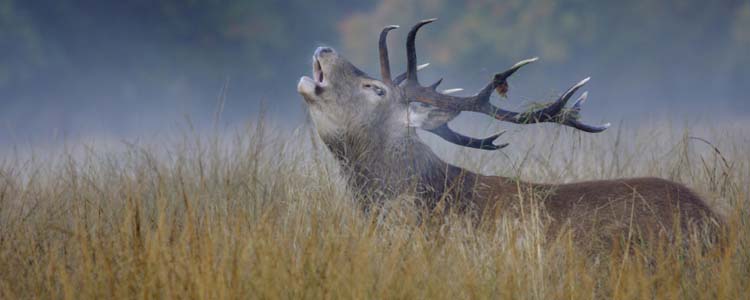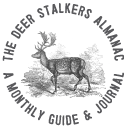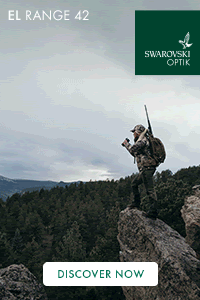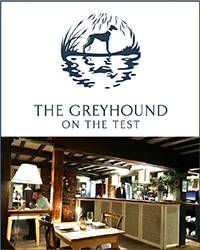Locked down and overseas, Dr Simon Lee reflects on human/animal interactions during the Coronavirus and reviews the lessons learnt from past disasters.
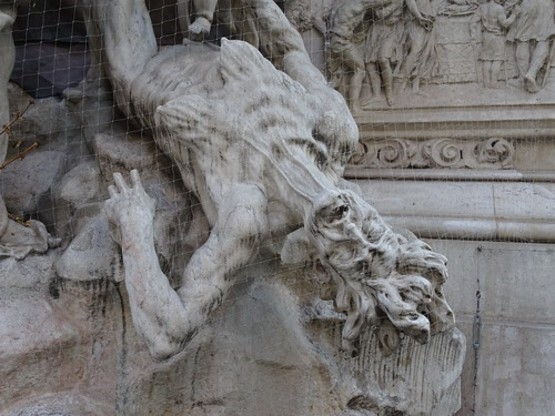
(Above: The Pestsaul Plague Column in Vienna)
Having been away from the action at home for some time due to work confinement, I can't help reflecting on the impact on our local fauna during our current national healthcare situation and past disasters.
Fortunate to be living in a pleasantly rural part of Hampshire, my access to the outdoors is better than most. With a few thousand acres of fields and woods to manage, the daily interactions with our local fauna keeps my finger on the pulse of what's going on out there. But what happens when we take ourselves out of the equation?
I'm going to go back to previous disasters, pandemics, and other health emergencies we have caused and fallen prey to.
The Black Death, Europe 1346 to 1353
 This hideous health crisis affected almost all of Europe at one stage or another and changed society and economics forever. Arriving supposedly in bolts of cloth, this fearsome epidemic originated in a bacterium, Yersinia Pestis, in fleas, on rats. With no established healthcare, Britain got hit very hard and very fast, with the symptoms coming on even faster, a fever, swelling of the lymph nodes and you were almost certainly doomed.
This hideous health crisis affected almost all of Europe at one stage or another and changed society and economics forever. Arriving supposedly in bolts of cloth, this fearsome epidemic originated in a bacterium, Yersinia Pestis, in fleas, on rats. With no established healthcare, Britain got hit very hard and very fast, with the symptoms coming on even faster, a fever, swelling of the lymph nodes and you were almost certainly doomed.
With no antibiotics or cure, isolation was almost automatic. The plague village of Eyam in Derbyshire only just survived by total isolation for the duration, and measures such as washing coins for payment in a local well were taken to combat infection.
So many people died so quickly that the usual burial rites were often forgotten, leading to huge mass burial pits to contain the multiple casualties. Some of these plague pits in London are still, due to the longevity of the bacterium, investigated thoroughly prior to development even today.
European cathedrals sport gilded statues to the Virgin Mary with haloes of stars, each star representing a month of plague survived in that area.
What became of our wildlife during this time is poorly recorded, but it heralded an enduring dislike of rats and vermin, modern discoveries such as leptospirosis in rat's urine haven't helped our regard for them either. As well as restructuring rural labour, which soon became highly valuable, this phase changed the face of society in Europe forever.
Chernobyl 1986
Next, we turn our attention to the 1986 Chernobyl disaster, after control was lost, ironically during a safety test, there was an explosion in the No.4 reactor that contaminated a huge area, which with a typically heavy handed soviet response, generated an exclusion zone of 30km that was eventually cleared of all inhabitants, topsoil, forest, and all animals, both domestic and wild with maximum prejudice.
Still under tight restrictions to this day, the reactor was eventually declared contained by 2017, the forested area around the ghost town of Pripyat has become an 'involuntary park' and has a growing population of deer, boar, wolves, and wild horses.
Not that anyone would be in a great rush to fill their freezer with any of them. One can only wonder what long term health problems have manifested in the meantime. Mutations such as deformities and cancers have gone untracked, I imagine numbers have rocketed but general health declined, it's not on my destination list for a euro hunting trip, as I am squeamish when it comes to the effects of ionising radiation.
Following the event, reports of deformities in reindeer by their Saami herders (see articles passim) despite being hundreds of kilometers away, showed a rise in tumours and liver diseases in their herds. For a people obsessed by the health of their herd this caused a huge impact, even closer to home, welsh lamb was off the menu and milk supplies disrupted. Mistakes made, but lessons learned?
Fukushima 2011
The next big blip came from another nuclear accident, this time in Japan.
Following a geothermal event (earthquake and tsunami to the rest of us), the Fukushima Nuclear Power Station suffered a triple meltdown after the emergency generators were swamped. Emergency services and a management plan sprang into action and the leak was contained, but not before the leak contaminated the area.
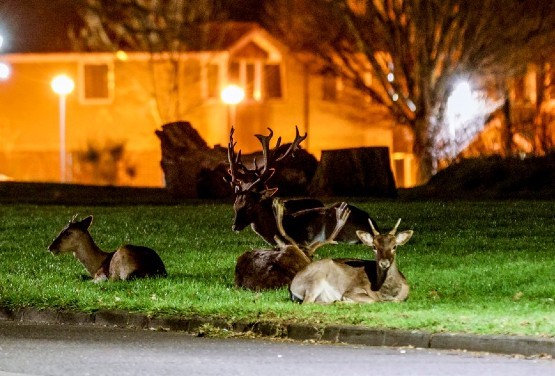
(Urban Deer are being seen more readily in the towns and cities)
Having contained the leak, like the town of Pripyat in the Ukraine, a 20km exclusion area was established. With an already healthy population of boar and sika deer the town of Namie, population 21,000 was evacuated, leaving the fauna to take over the town unmolested. A clean-up program started in 2018, is expected to finish in 2023, by which time who know what the animals will have developed into, with no clear plan to control them?
Back to the UK, and up to date, I have it on good authority that urban foxes are becoming bolder by the day and with the absence of traffic, groups of local fallow deer are spilling out onto the verges. On our patch, having been spared the annual 1st April bloodlust, Roebucks have become more visible and less wary.
From a roe deer's point of view, this human lockdown couldn't have come at a better time, no one about to annoy you as you strip velvet, mark territory, and start to find a mate.
Crop, in our patch was just starting to reach a good height and succulence, so food was plentiful as were young shoots of spring growth. Last year's crop, all bound for Walkers Crisps, held little attraction for the deer as leaves full of toxic solanine held little appeal and sightings slowed down significantly. This year's wheat is far more enticing.
Muntjac, once a rarity, have been far more bold, requiring tighter management. Poor old Munties, no ‘off season’ and often treated with less than the respect they deserve and more often as little better than vermin. However, I do have recipes. . .
So, like the butterflies wings beating far away, the effects are felt elsewhere, just the absence of humans for six weeks has affected both numbers and behaviour of deer in our area, how long these effects will last will remain to be seen, but it would be a great mistake to come down harder on the deer as restrictions ease.
Other effects of the lockdown and isolation have meant that the reduced foot traffic of walkers on paths through our permissions has made tracking easier, a few weeks indoors and a bit of rain suggested a huge Fallow presence on one particular beat. The excitement was moderated by the reality on the ‘Trailcam’ that betrayed a mere six fallow repeatedly crossing rather than the initial cattle stampede we'd assumed! Read the signs correctly, lesson learned!
To conclude, our lockdown has definitely affected our quarry and our environment, I gather this is not unique, they tell me the canals of Venice are clearing, and wild salmon catches in Canada have improved as pollution levels have fallen globally.
I'm eagerly looking forward to getting back to the countryside when possible, credit is due to my apprentices, who have helped keep the promises to the various landowners despite the Covid19 'difficulties', well done Gents!
Those wishing to take advantage of the Capreolus Club Plus scheme are welcome to visit and try their luck with a few enhanced odds at a deer!
Good Luck!
Note from the editor:
Thanks to Simon.
Here at County deer Stalking, we have noticed that since the easement of the Coronavirus ‘lockdown’ rules, the desire for people to get out into the countryside and reconnect with nature, has been nothing short of astonishing.
Perhaps, to have been denied access to something that has previously been taken for granted, has caused many to rediscover their admiration for the countryside.
My hope, indeed, my expectation, is that this rediscovered love and respect for the countryside will be with us for some substantial time to come and there can be no more real way of connecting with nature than participating in it. Therefore, if you’d like to discover more about how to get into deer stalking then a crucial first step is by taking the PDS1 Deer Stalking Certificate. You can find out more details here: proficient-stalker
Or alternatively, please contact us on: 0203 981 0159 or email:
If you'd like to read more from Simon in which he looks at alternative hunting customs, please just follow this link: different-cultures-different-customs




